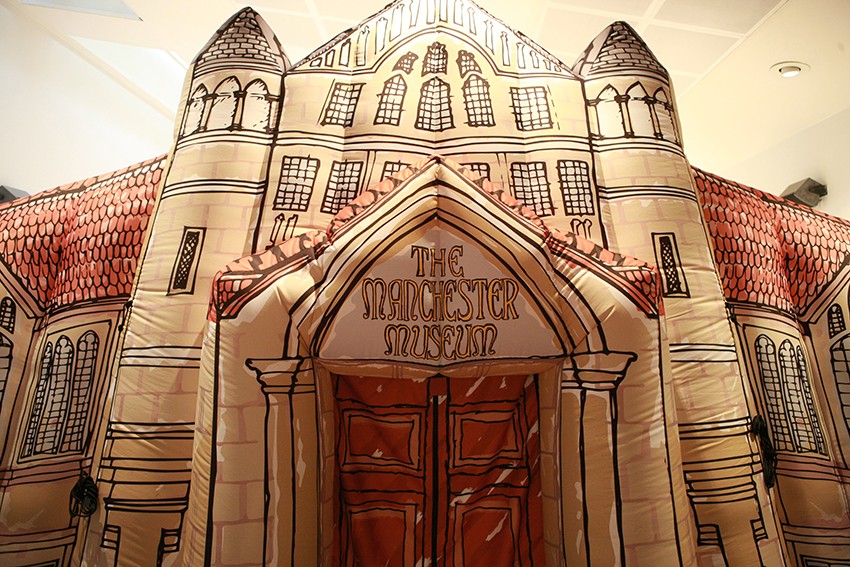Science and the City as University takes over ¼â½ÐÊÓƵapp for ESOF

Reanimating organs in a library, an inflatable museum and cancer as art – The ¼â½ÐÊÓƵapp is playing a major part in Science in the City this month, where thousands of people are expected to visit public spaces to take part in fun and cutting-edge science.
The full programme of more than 40 events accompanying conference can be found , but below are a few highlights from The ¼â½ÐÊÓƵapp’s involvement.
And if you want to see where our cutting edge science takes place, don’t forget to check out our , happening at the same time.
22-29 July
Visit the Allotment of the Future to explore how we could make the most of our urban spaces to grow food in the future and what kind of menus we might be choosing from in years to come.
Ever wondered what it might be like to have bugs for breakfast, algae for lunch, or grow crops from used coffee grounds? Find out how technology might change domestic growing and discover what’s so important about soil.
23-29 July
Sit down in conversation with an incredible array of talent from across the scientific, literary and arts communities in the Petri Parlour – the place where ideas grow. Click on the links below for more information and booking.
23 July
On 23rd July 2016, 12 female scientists will take to their soapboxes in Piccadilly Gardens, ¼â½ÐÊÓƵapp city centre to demonstrate and discuss their research. Come and be inspired by cool science from across the North West. There will be something for everyone; from clouds to cancer, protons to parasites, neuropsychology to nanoscience. Think you won’t understand it? Think again. Come and find out how scientific research informs everyday life. Don’t miss it!
23-29 July
To celebrate ¼â½ÐÊÓƵapp’s year as European City of Science, we’re bringing Cancer Research UK’s research to life like never before. Designers from The ¼â½ÐÊÓƵapp and ¼â½ÐÊÓƵapp Metropolitan University have worked with researchers from and patient volunteers to create unique artworks that showcase our latest scientific advances and tell the personal journeys of people affected by cancer.
25 July
brand new Inflatable Museum will be popping up in ¼â½ÐÊÓƵapp Cathedral for a day of interactive, exploratory activities for under-5s and their families.
25 July
What is it like to give birth stateless and in transition and what is the impact on the women and children involved?
One of the most pressing issues of our time is one of the questions driving B!RTH, a festival of work which will explore global health inequality through the lens of childbirth at the Royal Exchange Theatre. Join The ¼â½ÐÊÓƵapp’s Professor of Global Health and Humanitarian Affairs, Mukesh Kapila CBE, and award-winning Syrian playwright Liwaa Yazji with other panellists to explore the realities, the struggle and the hope of new life and what can be done to prevent a generation being forever lost.
26 July
In this celebration of Science and Poetry, we have paired together some of ¼â½ÐÊÓƵapp’s finest young poets with researchers from across the ESOF programme. Following the ESOF Science Meets Poetry daytime event, these poets will perform their collaborative pieces in the setting of . Biology battles balladry, physics pairs with pentameter, and chemistry confronts cadence in a celebration of the creative similarities between science and the performing arts.
26 July
Join us for an evening where women debate important questions, celebrate the careers of female scientists, innovators and educators, and inspire women to become leaders in their field. Featuring a series of informal social events, the evening will encourage new dialogue between women from across Greater ¼â½ÐÊÓƵapp as well as those visiting for the EuroScience Open Forum.
Featuring: , astrophysicist, ¼â½ÐÊÓƵapp
27 July
Climate change is happening all around us, and this isn’t the time to ignore it, it’s the time to get really, really, creative. Join scientists and artists for an evening of creativity exploring a zero carbon future.
29 July
When a vital organ, such as the heart, lungs, or kidneys stops working, our lives are in great danger. But advances in medical science have made it possible for us to receive replacements, transplanted from deceased or living donors. At Reanimate, visitors can see a kidney working and a heart beating outside of the body, and explore the possibilities of organs returning to life.
Drop in and learn more about reconditioning donor organs for transplantation from and his team from the ¼â½ÐÊÓƵapp Collaborative Centre for Inflammation Research at The ¼â½ÐÊÓƵapp.